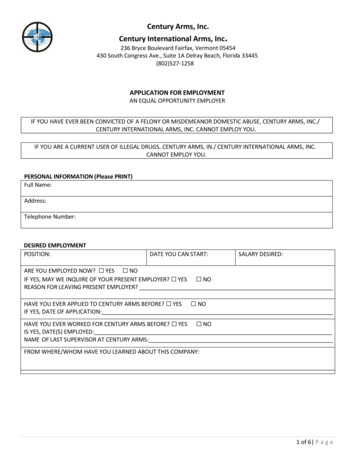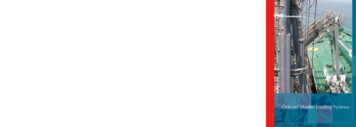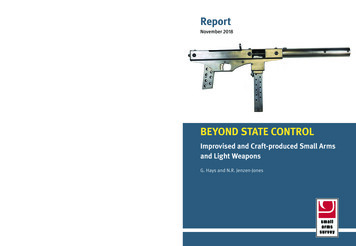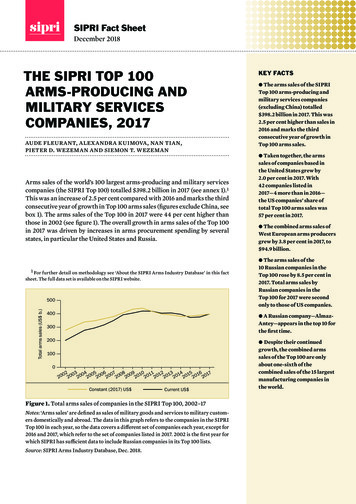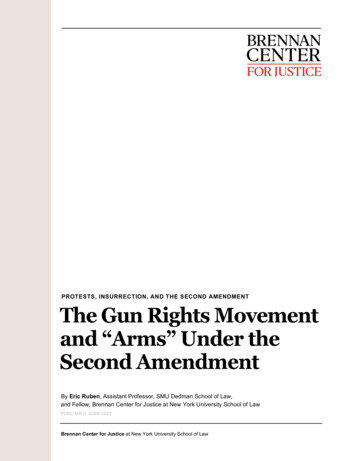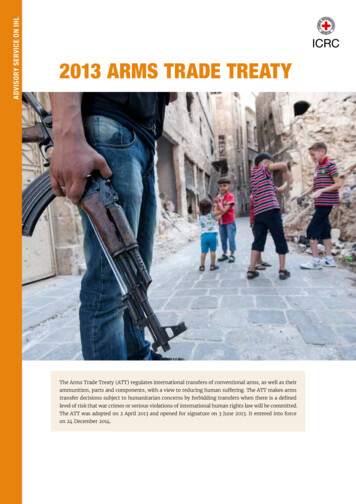
Transcription
ADVISORY SERVICE ON IHL2013 ARMS TRADE TREATYThe Arms Trade Treaty (ATT) regulates international transfers of conventional arms, as well as theirammunition, parts and components, with a view to reducing human suffering. The ATT makes armstransfer decisions subject to humanitarian concerns by forbidding transfers when there is a definedlevel of risk that war crimes or serious violations of international human rights law will be committed.The ATT was adopted on 2 April 2013 and opened for signature on 3 June 2013. It entered into forceon 24 December 2014.
WHAT IS THE OBJECT AND PURPOSE OF THE ATT?The object of the ATT is to establish the highest possible common international standards for regulating the international trade in conventional arms, to prevent and eradicate the illicit trade inconventional arms, and to prevent their diversion. This, in turn, is for the purpose of contributing toregional and international peace, security and stability, reducing human suffering, and promotingcooperation, transparency and responsible action by States Parties (Article 1).TO WHAT ARMS DOES THE ATT APPLY?It applies, at a minimum, to the following categories of conventional arms: battle tanks, armouredcombat vehicles, large-calibre artillery systems, combat aircraft, attack helicopters, warships, missiles and missile launchers and small arms and light weapons (Article 2(1)). States are encouragedto voluntarily apply the treaty to the broadest range of conventional arms (Article 5(3)).The ATT also applies to ammunition/munitions that are fired, launched, or delivered by the conventional arms covered in the treaty (Article 3), and to the parts and components that are in a formthat makes it possible to assemble the conventional arms covered in the treaty (Article 4). Only thecore obligations of the ATT (found in Articles 6 and 7 on transfer prohibitions and export criteriarespectively) apply to ammunition/munitions and parts and components.TO WHAT TRANSACTIONS DOES THE ATT APPLY?The ATT applies to the activities of the international trade comprising export, import, transit,trans-shipment and brokering, which are referred to in the treaty as ‘transfer’ (Article 2(2)).WHAT ARMS TRANSFER CRITERIA DOES THE ATT IMPOSE?A. Transfer prohibitionsIt prohibits transfers of arms, ammunition/munitions and parts and components where the transfer would violate obligations under measures adopted under Chapter VII of the Charter of theUnited Nations, “in particular arms embargoes”(Article 6(1)). The ATT also prohibits transfers ofsuch weapons and items where the transfer wouldviolate a State Party’s “relevant international obligations under international agreements to which itis a Party, in particular those relating to the transfer of, or illicit trafficking in, conventional arms”(Article 6(2)).Transfers of arms, ammunition/munitions andparts and components are also prohibited if theThe object of the ATT is to establishthe highest possible commoninternational standards for regulatingthe international trade in conventionalarms, to prevent and eradicate theillicit trade in conventional arms,and to prevent their diversion.State Party has knowledge at the time of authorization that the arms or items would be used in the commission of genocide, crimes againsthumanity, grave breaches of the four Geneva Conventions, attacks directed against civilian objectsor civilians protected as such, or other war crimes as defined by international agreements to whichit is a Party (Article 6(3)).For instance, an ATT State Party that is also party to the Statute of the International CriminalCourt and to Protocol I of 8 June 1977 additional to the Geneva Conventions, would be required totake into consideration a wide range of war crimes.B. Criteria to assess exportIf an export has not been prohibited under Article 6, the exporting State Party must assess whetherthe arms, ammunition/munitions or parts and components would contribute to or undermine peaceand security, and whether there is a “potential” that they could be used to commit or facilitate aserious violation of international humanitarian law, a serious violation of international humanrights law, an act constituting an offence under international instruments relating to terrorism towhich the State is a Party, or an act constituting an offence under international instruments relatingto transnational organized crime to which the State is a Party (Article 7(1)).2
In this assessment, each State Party must also take into account the risk of the conventional armsor items being used to commit or facilitate serious acts ofgender-based violence or serious acts of violence againstwomen and children (Article 7(4)).With regard to the consequences identified in Article 7(1),the State Party must also consider whether there are riskmitigation measures that could be undertaken (Article 7(2)).Each State Party must takeappropriate measures to enforcenational laws and regulationsthat implement the provisionsof the Treaty (Article 14).If, after conducting this assessment and considering available mitigating measures, the exporting State Party determines that there is an overriding risk of anyof the adverse consequences in Article 7(1), it must not authorize the export (Article 7(3)).A number of States Parties have declared upon ratification that they will interpret the term ‘overriding’ risk as ‘substantial’ or ‘clear’ risk.The treaty encourages a State Party to reassess an authorization if it becomes aware of relevant newinformation (Article 7(7)).As Article 7 relates only to exports, the activities of import, transit, trans-shipment and brokeringare not subject to such an assessment or to any of the criteria set out in this provision.HOW CAN A STATE BECOME A PARTY TO THE ATT?The ATT entered into force on 24 December 2014, 90 days following the date of the deposit of the50th instrument of ratification, acceptance or approval.To become a party to the ATT, a State that has signed the Treaty before its entry into force must ratify, accept or approve it. The ATT is open for accession by any State that has not signed it before itsentry into force. The Treaty will enter into force for that State 90 days following the date of depositof its instrument of ratification, acceptance, approval or accession (Article 22).WHAT MUST STATES DO TO IMPLEMENT THE ATT?Each State Party must implement the ATT in a consistent, objective and non-discriminatory manner, bearing in mind the Principles referred to in the treaty (Article 5(1)), such as the Principle ofrespecting and ensuring respect for international humanitarian law and human rights.Each State Party must take measures necessary to implement the Treaty and establish and maintainan effective and transparent national control system (Article 5(2) and 5(5)). This includes measuresto regulate the import (Article 8), transit, trans-shipmentTo become a party to the ATT, a Statethat has signed the Treaty before itsentry into force must ratify, acceptor approve it. The ATT is open foraccession by any State that has notsigned it before its entry into force.of (Article 9), and brokering activities related to (Article 10)conventional arms, and to regulate the export of conventional arms, related ammunition and parts and components(Article 5(5)).As part of its national control system, each State Partymust establish and maintain a national control list of theweapons and items covered. This list must be made available to other States Parties. States are encouraged to publishtheir control list (Article 5(2) and (4)). In addition, eachState Party must designate competent national authorities (Article 5(5)), as well as one or morenational points of contact to exchange information on matters related to the treaty’s implementation (Article 5(6)).Each State Party involved in the transfer of conventional arms must take measures to prevent theirdiversion (Article 11(1)). States involved in export, transit, trans-shipment, and import must cooperate and exchange information in order to mitigate the risk of diversion of conventional arms3
covered under the ATT (Article 11(3)). States Parties must take appropriate measures to addressdiversion they detect, and are encouraged to share information on effective measures to addressdiversion (Article 11(4-5)).States Parties must maintain national records of export authorizations or actual exports of conventional arms and are encouraged to do so for imports, transit and trans-shipment. The ATT providesrecommendations on the types of information to be recorded and requires that the records be keptfor at least 10 years (Article 12).States Parties must report on the implementation measures they have undertaken. A State Partymust submit, within a year after the treaty’s entry into force, an initial report on implementationmeasures (such as national laws, control lists and administrative measures). After that, States mustreport on any new implementation measures undertaken “when appropriate”.States Parties must also report annually on authorized or actual exports and imports of conventional arms. All reports will be shared with other States Parties (Article 13).Each State Party must take appropriate measures to enforce national laws and regulations thatimplement the provisions of the Treaty (Article 14).The ATT gives each State Party the discretion to determine the form, structure and legislativeunderpinning of its national control system. In practice, implementation will demand an assessment of what legislative, administrative and other measures are necessary to comply with ATTobligations. Such measures must, notably, ensure respect for the Treaty by natural and legal personswithin the jurisdiction of the State Party, for instance, by establishing an effective licensing process,ensuring implementing authorities have adequate resources and technical expertise, and imposingadministrative penalties and penal sanctions.At the Conference of States Parties, convened annually, States Parties, among other things, reviewthe implementation of the treaty, and consider amendments to it as well as issues related to itsinterpretation (Article 17).WHAT SUPPORT IS AVAILABLE FOR ADHERENCE AND IMPLEMENTATION?The United Nations has published a ratification guide describing the procedures that States mustfollow in order to sign, ratify, accept, approve, or accede to the ATT, available at -treaty-2. The guide contains model instruments ofadherence for States to deposit with the Secretary-General of the United Nations. The guide isavailable in English, French and Spanish on the same website. Additional tools and guidelines,including a ‘Welcome Pack for New States Parties to the Arms Trade Treaty’ are available online nes.html.The ICRC is ready to assist States in implementing the Treaty, within the limits of its mandate andexpertise in international humanitarian law. It will do so through its Advisory Service on International Humanitarian Law, which can provide guidance to governments on incorporating the ATT’srequirements in domestic legislation. The ICRC has also put out publications to assist States inunderstanding the treaty’s requirements and in adopting effective implementation measures.11See “Understanding the Arms Trade Treaty from a Humanitarian Perspective” available at -treaty-from-a-humanitarian-perspective-pdf-en, and “ArmsTransfer Decisions: Applying International Humanitarian Law and International Human Rights Law Criteria– a Practical Guide” available at -en.4
MISSIONThe International Committee of the Red Cross (ICRC) is an impartial, neutral and independentorganization whose exclusively humanitarian mission is to protect the lives and dignity of victims ofarmed conflict and other situations of violence and to provide them with assistance. The ICRC alsoendeavours to prevent suffering by promoting and strengthening humanitarian law and universalhumanitarian principles. Established in 1863, the ICRC is at the origin of the Geneva Conventions andthe International Red Cross and Red Crescent Movement. It directs and coordinates the ernational Committee of the Red Cross19, avenue de la Paix1202 Geneva, SwitzerlandT 41 22 734 60 01shop.icrc.org ICRC, December 202012.2020facebook.com/icrcCover photo: H. Vanesian/ICRCactivities conducted by the Movement in armed conflicts and other situations of violence.
The Arms Trade Treaty (ATT) regulates international transfers of conventional arms, as well as their ammunition, parts and components, with a view to reducing human suffering. The ATT makes arms . At the Conference of States Parties, convened annually, States Parties, among other things, review
